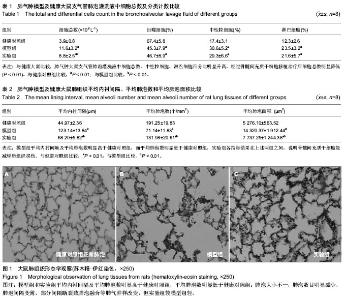| [1] Zhao Y, Cui A, Wang F, et al. Characteristics of pulmonary inflammation in combined pulmonary fibrosis and emphysema. Chin Med J (Engl). 2012;125(17):3015-3021.
[2] Tanabe N, Muro S, Tanaka S, et al. Emphysema distribution and annual changes in pulmonary function in male patients with chronic obstructive pulmonary disease.Respir Res. 2012; 13:31.
[3] Thébaud B, Ladha F, Michelakis ED, et al. Vascular endothelial growth factor gene therapy increases survival, promotes lung angiogenesis, and prevents alveolar damage in hyperoxia- induced lung injury: evidence that angiogenesis participates in alveolarization. Circulation. 2005;112(16): 2477-2486.
[4] 孙琰玮,李宝平,王轩,等.Ad-GFP修饰的间充质干细胞在肺气肿大鼠体内向肺部的定向迁移[J].中国组织工程研究与临床康复, 2010,14(14):2528-2532.
[5] 戈霞晖,白冲.间充质干细胞与肺疾病的研究进展[J].国际呼吸杂志,2010,20(17):1069-1071.
[6] Li BP, Zhao XJ, Song YM, et al. Restoration of pathological changes of emphysema by angiogenesis factors: experiment of rats. Zhonghua Yi Xue Za Zhi. 2007;87(33):2365-2368.
[7] 李宝平,赵晓建,宋永明,等.骨髓间充质干细胞移植对实验性肺气肿大鼠动脉血气及肺组织病理学变化的影响(英文)[J].中国组织工程研究与临床康复,2007,11(50):10176-10180.
[8] Cyranoski D. Stem cells in Texas: Cowboy culture. Nature. 2013;494(7436):166-168.
[9] Vincent LG, Engler AJ. Stem cell differentiation: Post-degradation forces kick in. Nat Mater. 2013;12(5): 384-386.
[10] Jacobs SA,Roobrouck VD,Verfaillie CM,et al. Immunological characteristics of human mesenchymal stem cells and multipotent adult progenitor cells. Immunol Cell Biol. 2013; 91(1):32-39.
[11] Jankowich MD, Rounds SI. Combined pulmonary fibrosis and emphysema syndrome: a review. Chest. 2012;141(1):222- 231.
[12] Vidal D, Fortunato G, Klein W, et al. Alterations in pulmonary structure by elastase administration in a model of emphysema in mice is associated with functional disturbances. Rev Port Pneumol. 2012;18(3):128-136.
[13] Tzouvelekis A, Zacharis G, Oikonomou A, et al. Combined pulmonary fibrosis and emphysema associated with microscopic polyangiitis. Eur Respir J. 2012;40(2):505-507.
[14] Tanabe N, Muro S, Sato S, et al. Longitudinal study of spatially heterogeneous emphysema progression in current smokers with chronic obstructive pulmonary disease. PLoS One. 2012;7(9):e44993.
[15] Adir Y, Shachner R, Amir O, et al. Severe pulmonary hypertension associated with emphysema: a new phenotype. Chest. 2012;142(6):1654-1658.
[16] Le PF, Das NJC, Cazes A, et al. Lung volume reduction surgery for emphysema and bullous pulmonary emphysema. Rev Pneumol Clin. 2012;68(2):131-145.
[17] Arango E, Espinosa D, Illana J, et al. Lung volume reduction surgery after lung transplantation for emphysema-chronic obstructive pulmonary disease. Transplant Proc. 2012;44(7): 2115-2117.
[18] Roulet A, Armand L,Dagouassat M,et al. Intratracheally administered titanium dioxide or carbon black nanoparticles do not aggravate elastase-induced pulmonary emphysema in rats. BMC Pulm Med. 2012;12:38.
[19] Kishaba T, Shimaoka Y, Fukuyama H, et al. A cohort study of mortality predictors and characteristics of patients with combined pulmonary fibrosis and emphysema. BMJ Open. 2012;2(3). pii: e000988.
[20] Caramori G, Casolari P, Garofano E, et al. Role of stem cells in the pathogenesis of chronic obstructive pulmonary disease and of pulmonary emphysema]. Recenti Prog Med. 2012; 103(1):31-40.
[21] Barry F, Murphy M. Mesenchymal stem cells in joint disease and repair. Nat Rev Rheumatol. 2013 Jul 23.
[22] Longhini-Dos-Santos N, Barbosa-de-Oliveira VA, Kozma RH, et al. Cell therapy with bone marrow mononuclear cells in elastase-induced pulmonary emphysema. Stem Cell Rev. 2013;9(2):210-218. Stem Cell Rev. 2013;9(2):210-218.
[23] Lau AN, Goodwin M, Kim CF, et al. Stem cells and regenerative medicine in lung biology and diseases. Mol Ther. 2012;20(6):1116-1130.
[24] 李宝平,邢万红,路鹏雁,等.生长因子及骨髓间充质干细胞与肺再血管化修复烟熏大鼠肺气肿模型[J].中国组织工程研究与临床康复,2010,14(2):227-232.
[25] 邹健勇,罗红鹤,陈振光.骨髓间充质干细胞在特发性肺纤维化治疗中的潜在应用价值[J].中国组织工程研究与临床康复,2008, 12(47):9339-9342.
[26] Ma S, Zhong D, Chen H, et al. The immunomodulatory effect of bone marrow stromal cells (BMSCs) on interleukin (IL)-23/IL-17-mediated ischemic stroke in mice. J Neuroimmunol. 2013;257(1-2):28-35.
[27] Song G, Habibovic P, Bao C, et al. The homing of bone marrow MSCs to non-osseous sites for ectopic bone formation induced by osteoinductive calcium phosphate. Biomaterials. 2013;34(9):2167-2176.
[28] Tian Z, Li Y, Ji P, et al. Mesenchymal stem cells protects hyperoxia-induced lung injury in newborn rats via inhibiting receptor for advanced glycation end-products/nuclear factor kappaB signaling. Exp Biol Med (Maywood). 2013;238(2): 242-247.
[29] Andreeva ER, Buravkova LB. Multipotent mesenchymal stromal and immune cells interaction: reciprocal effects. Ross Fiziol Zh Im I M Sechenova. 2012;98(12):1441-1459.
[30] Casiraghi F, Perico N, Remuzzi G. Mesenchymal stromal cells to promote solid organ transplantation tolerance. Curr Opin Organ Transplant. 2013;18(1):51-58. |



